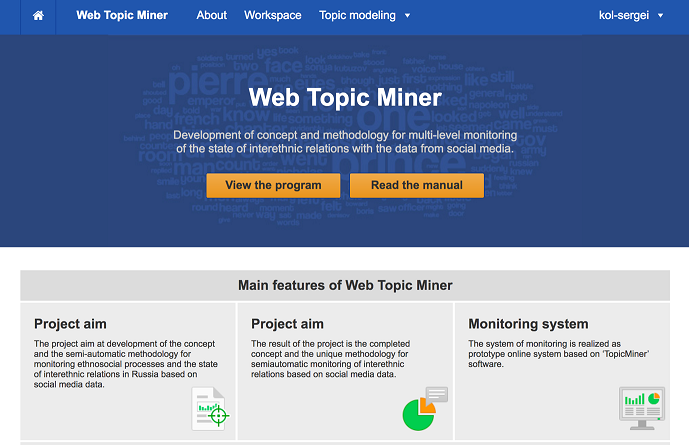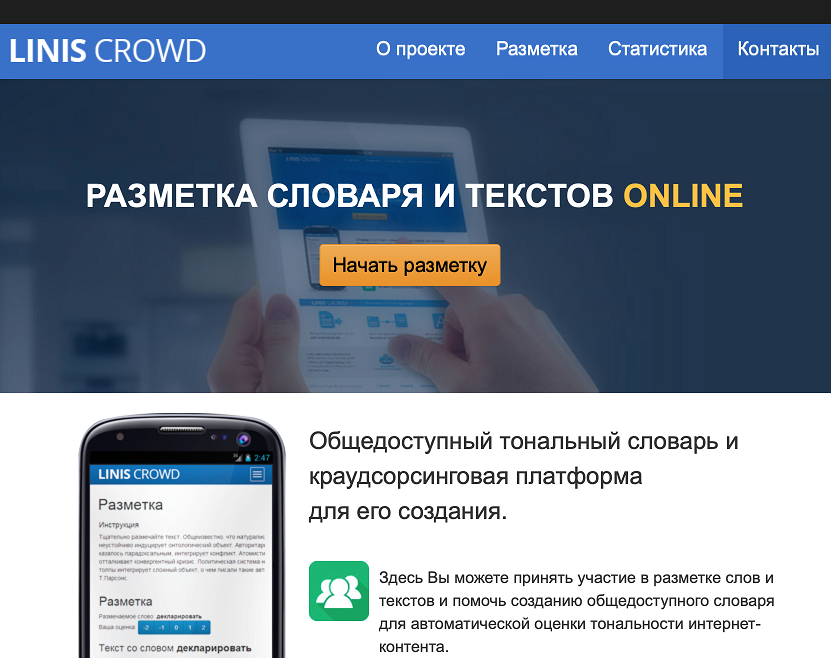Software Support
1. TopicMiner
Interface software for topic modeling and a visual analysis of the results.
Programming language: C++, Delphi 7, and CUDA.
Development time: 09.2012 - to present
Developers: S. Koltsov and V. Filippov.
Options:
- Data uploading from BlogMiner and text files;
- Data parsing;
- Lemmatization via Mystem (Yandex);
- Word frequency calculation, creating stop word lists, and deleting stop words according to the word list and frequencies;
- Topic modeling: LDA with Gibbs Sampling;
- Recurrent topic modeling;
- Browsing summary matrices of words and texts on topics, and matrix sorting;
- Quality calculation and visualization (perplexity);
- Uploading results in a CSV file;
- Calculation of average intervals among words in a given word combination and documents.
Expected: a topic comparison based on Kullback-Leibler divergence.
Download:
TopicMiner_LINIS (RAR, 19.47 Mb)
2. WebTopicMiner
The latest version of TopicMiner is server-based and allows to handle remotely huge document collections.
Additionally, the web-version has an improved interface for interactive exploration of topic models and visualization of results.
Currently, the web-version supports LDA and BigARTM algorithms as well as dictionary-based sentiment analysis for most European languages (including Russian).
Download: WebTopicMiner
3. VKMiner (Social Network)
Download VKMiner_2017
An information system interface for working with the social network ‘Vkontakte’
Programming language: Delphi XE2 and SQL
Development time: 02.2013 – present
Developers: S. Koltsov and V. Filippov.
Options:
- Uploading a user’s personal data based on a given ID;
- Uploading a user’s friends list, and ego network calculation;
- Uploading a user’s group lists;
- Uploading lists of group members in ‘Vkontakte’ based on a group ID (with users’ metadata);
- Uploading friends lists of group members, and friendship network calculation;
- Full-text uploading of a group wall (posts, correlated to authors and dates; comments, correlated to posts, commentators, and dates; ‘likes’, correlated to authors, posts, and comments);
- Storing data in relational tables on an MS SQL Server;
- Uploading results in a CSV file.
Expected: a calculation of network liking and commenting by groups; full-text uploading of group discussions.
4. DigiFriends App
We developed this app to collect data for our project ‘Digital Friends’ (DigiFriends). It was designed for VK (previously, Vkontakte) online social network. The app asks a participant to complete a survey and to download her profile data (with informed consent). Survey questions cover the following user characteristics:
Psychological and socio-demographic features:
- The propensity to make social connections [1];
- Rosenberg self-esteem scale – two items [3];
- Subjective well-being;
- Sex, age, education level.
Features of online behavior:
- Privacy attitudes scale [2];
- Behaviors related to privacy features of VK;
- Frequency and duration of VK sessions;
- Goals for using VK.
Social capital:
- Online social capital scale [4].
Data collected from user profiles include personal page information, friends’ IDs, user activity on ‘wall’. All data is collected with informed consent which is presented before the survey and any access to behavioral data. Data collection starts with pushing the ‘Start’ button.

After completing the questionnaire users' are provided by gamesome feedback.
You can find the app via the link.
App developer: Maxim Koltsov
References:
[1] Totterdell P., Holman D., Hukin A., "Social networkers: measuring and examining individual differences in propensity to connect with others," Social Networks, vol. 30, pp. 283-296, 2008.
[2] Stutzman, F., Capra, R., & Thompson, J. (2011). Factors mediating disclosure in social network sites. Computers in Human Behavior, 27(1), 590-598.
[3] Rosenberg, M. (1965). Society and the adolescent self-image. Princeton, NJ: Princeton University Press.
[4] Williams, D. (2006). On and off the’Net: Scales for social capital in an online era. Journal of computer-mediated communication, 11(2), 593-628.
5. LINIS CROWD
LINIS CROWD is a web-based application for crowd-sourced mark up of document collections. The system has been used to develop a Russian language dictionary of sentiment-bearing words from the socio-political domain.

The platform and the sentiment dictionary available here.
You can learn more about LINIS CROWD in this publication [in Russian]:
Алексеева, С. В., Кольцов, С. Н., & Кольцова, О. Ю. (2015). Linis-crowd.org: лексический ресурс для анализа тональности социально-политических текстов на русском языке. In XVIII Объединенная научная конференция «Интернет и современное общество» (IMS‑2015) (pp. 25–34). Санкт-Петербург. http://openbooks.ifmo.ru/ru/file/2203/2203.pdf
For more information about using databases and software developed by LINIS, please contact linis-spb@hse.ru.
Have you spotted a typo?
Highlight it, click Ctrl+Enter and send us a message. Thank you for your help!
To be used only for spelling or punctuation mistakes.